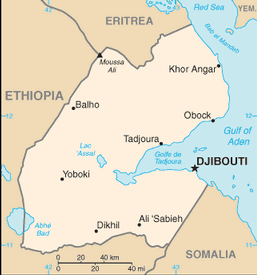 I just caught wind of a now all-too-familiar story in international broadcasting–this time, via Reporters Without Borders.
I just caught wind of a now all-too-familiar story in international broadcasting–this time, via Reporters Without Borders.
While I encourage you to read the full press release below, the summarized story is that Reporters Without Borders has launched a mirror web site for La Voix de Djibouti, an independent news source in Djibouti. Why? Because the regime in power in Djibouti, in an effort to stifle the free press, have decided to block the primary website of La Voix de Djibouti.
The article states (we add the boldface):
A Europe-based exile radio station that supports the opposition Renewal and Development Movement (MRD), La Voix de Djibouti, began by broadcasting on the short wave and then switched to being a web radio, but the authorities have blocked access to its website from within Djibouti.
The decision to move off of shortwave has, in essence, severely limited their freedom of the press and their listeners’/subscribers’ access to information. Reporters Without Borders is addressing this censorship by actively creating mirror sites of La Voix de Djibouti that are hosted outside of the blocked domains.
This is admirable, and we strongly support their worthy efforts in creating mirror sites. However, this solution is, at best, full of holes:
- How do those who wish to follow the news find each new mirror site after it has been blocked? And presuming they can do so, how long will this take to figure out?
- Will the website reader be tracked by the government and/or punished for attempting to circumvent imposed blocking? (Hint: Most regimes now have tools to do this: read this and this.) Has anyone considered these consequences to any individual caught for circumventing a blocked site?
- What if the regime decides to simply turn off the internet? Can they do this? Sure they can…and frustratingly, they may.
As we’ve stated here many times before, the Internet is a wonderful information resource and it is proliferating across the planet. But with the Internet, as with FM radio, cable TV and terrestrial TV, repressive regimes can and do hold the power button, as well as the ability to control the content, or even take it over.
Shortwave radio is comparatively immune to this, and moreover, is untraceable. When we eliminate the infrastructure that supports shortwave broadcasting (as is happening at RCI Sackville) we are throwing the baby out with the bathwater.
Poor child.
Full article as follows:
 (Source: Reporters Without Borders)
(Source: Reporters Without Borders)
4 April 2012–Reporters Without Borders has today launched a mirror site of radio La Voix de Djibouti’s website, http://lavoixdedjibouti.com, in order to help circumvent the government’s censorship and allow the population to have access to a news sources to which it is being denied.
The media freedom organization invites Internet users to go to http://lavoixdedjibouti.rsf.org in order to access an exact copy of the original site.
“As this is a country without media freedom, where only government propaganda is tolerated, we think it is crucial to help the population to gain access to other news sources,” Reporters Without Borders said. “While it is true that the level of Internet use is still low in Djibouti, it is not negligible, and use of social networks in particular is growing. The population will now be able to read critical news bulletins online.”
A Europe-based exile radio station that supports the opposition Renewal and Development Movement (MRD), La Voix de Djibouti began by broadcasting on the short wave and then switched to being a web radio but the authorities have blocked access to its website from within Djibouti.
So that independent news websites that are targeted by cyber-attacks and government blocking can continue posting information online, Reporters Without Borders has started mirroring sites. The first sites to be mirrored were those of the Chechen magazine Dosh and the Sri Lankan online newspaper Lanka-e News. The organization has also been urging Internet users all over the world to create more mirrors of these sites in a chain of solidarity.
Mirror sites can be used to circumvent blocking by governments. Although the government of Djibouti is blocking access to La Voix de Djibouti’s site, http://lavoixdedjibouti.com, by blocking the site domain name or the hosting server’s IP address, Internet users can still access the Reporters Without Borders mirror site, http://lavoixdedjibouti.rsf.org, because it is hosted on another server with another domain name.
The mirror site will be regularly and automatically updated with all the new content posted on the original site. If the mirror is itself later also blocked, the creation of further mirror sites together with a regularly updated list of these mirrors will continue to render the blocking ineffective in what is known as a Streisand effect.
Reporters Without Borders urges Internet users who want to help combat censorship and have the ability to host a site on a web server to follow suit. Send the URL of the mirror site you have created to wefightcensorship [at] rsf.org. The next mirroring operations launched by Reporters Without Borders will be reported on the @RSF_RWB and @RSFNet Twitter accounts with the #RSFmirror hashtag.

I’m afraid we’ll only understand how important SW radio is and can be only when it’s too late. On the other side, funding for SW broadcasting is probably managed by the same people who wish to see it gone, so … humbug.